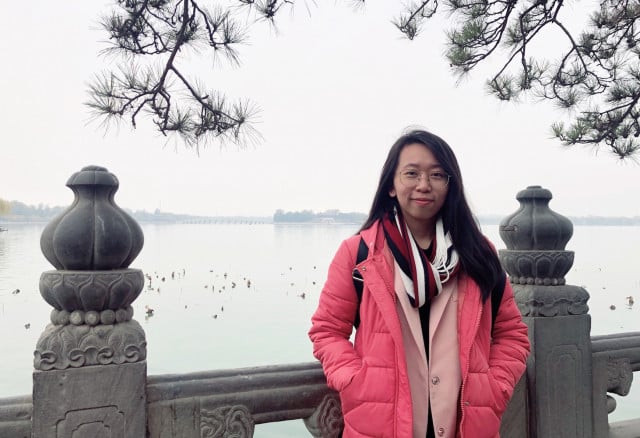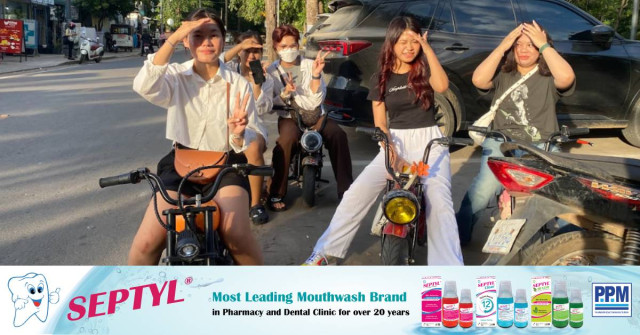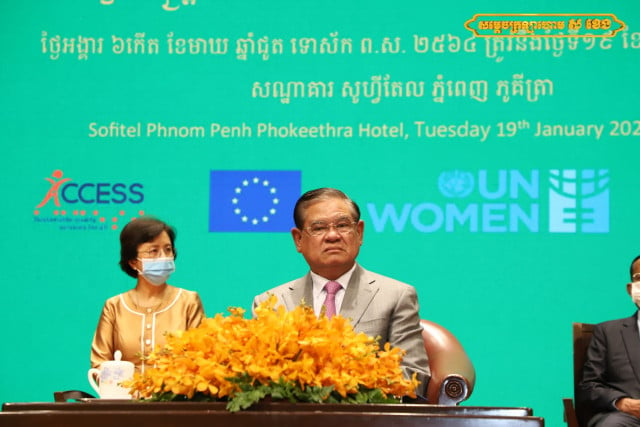Research and Debate Critical to Cambodia’s Water Security

- Sao Phal Niseiy
- July 26, 2020 8:34 AM
Having been awarded a research fellowship from Future Forum—an independent think-tank based in Cambodia—Horn Chanvoitey has been examining water and its relationship to peace and security under the Young Research Program since 2019. As a graduate from the Royal University of Phnom Penh, Chanvoitey explains how she hopes her International Studies degree and her research with Future Forum might contribute to the development of Cambodia.
Sao Phal Niseiy: The Young Researchers Program is especially competitive, what made you want to do it and why is the research conducted through it so important to you?
Horn Chanvoitey: Equipped with research skills, it allows me to think independently it opens doors to exciting opportunities. The process of research has taught me to go beyond just identifying the deep-rooted causes of problems, but also discern the potential impact of these problems that are not yet apparent.
Indeed, I learnt that there are various perspectives on how we see a problem—we should tackle problems from different angles and apply different approaches. Every issue should be examined from all sides because solutions are improved by diversity and understanding diverse perspectives.
Sao Phal Niseiy: Your research paper is on "Water Politics: The Future Prospects of Cambodia" so why is water governance important and how does it feed into regional security?
Horn Chanvoitey: The impact of water scarcity is already being felt in Cambodia, the 2016 drought affected almost 2.5 million Cambodians and the 2019 drought dried out a tributary of the Tonle Sap in Kampong Thom province. What was once considered to be a future crisis has grown more visibly present. This is a stark reminder that, although perched at the lower part the Mekong River basin and blessed with monsoons, Cambodia does not have guaranteed water security.
We need more debates and discussions on how to handle current and future water challenges, including who does what, at what level, who pays for what, and how and why specific policies are designed and implemented.

Sao Phal Niseiy: Your paper offers an insightful perspective on Cambodia’s current water governance as well as offers some substantive recommendations for coping with water conflicts and increased competition over resources, so if we look to the future, what is the biggest challenge in this area and how should the government address it?
Horn Chanvoitey: Considering the most alarming challenge, both water quantity and water quality need to be in the equation. By 2040, Cambodia is likely to wrestle with water scarcity and the degraded water quality from the rapid, often unchecked development such as dams, industrial waste, agricultural waste, and other runoffs. If this continues unabated, there will be high economic and health costs pertaining to water scarcity and water pollution. Take China and India for instance. Water pollution costs them billions of dollars every year. For Cambodia, it hinges critically on the government’s ability to align the economic planning with water development.
Sao Phal Niseiy: I found that in your analysis, you recommended that Cambodia formulates a National Water Security Policy to safeguard the future water resources. Can you elaborate a little bit more?
Horn Chanvoitey: Cambodia’s water governance and water security for the future is a growing issue, which is too often neglected in the development of broader, national policy. A National Water Security policy requires an understanding of the uncertainty related to climate change, urbanization, industrialization and demographic growth at the local scale. This policy should be formulated on the principle of inclusiveness, transparency, and accountability.
It projects short and long-term water trends, incorporating three components – ‘water accessibility and quality’ to ensure all the people access to quality water; ‘water development’ to provide space for innovations in water use efficiency; and ‘institution and people’s capacity development’ to adapt and mitigate future shocks.
However, with caveats in mind, it is an over-simplification to say that Cambodia needs a more comprehensive water policy. The water sector is fragmented, complex and interrelated with other fields. Pursuing security in one sector might lead to less security in another. For example, pursuing energy security could be at the expense of water security.
Therefore, the government needs to identify the mismatches, and grey areas of diverging and competing interests between water-related fields, including agriculture, industry, energy, environment, health, etc. to have a whole-of-government approach to cross-sectoral coordination. The robust policies are needed across different layers of government. Whenever possible, cost-benefit of policy responses is required to tailor specific circumstances.
Sao Phal Niseiy: Do you think your research can contribute to the country’s water governance development, particularly with regards to policy formulation?
Horn Chanvoitey: It’s a non-linear process. I hope that my research could draw the attention of the public, researchers and policymakers to what is actually important for Cambodia’s future water development and survival. Opinions on water governance and water security might diverge accordingly. But, through vibrant debates and discussions, it will reach out to more and more people, and help inform the public. Either directly or indirectly, silence means endorsing the status quo, which could constitute a far bigger problem for our society. Debate could expose people to policy alternatives.
I really encourage the studies and discussions on water issues in Cambodia. There are great diversities of reports, data and knowledge available out there, but they are underutilized. These resources can be reformulated, and mobilized to link to policy decisions, while, simultaneously, shaping public policy discussions at the early stage of planning. This should not be the task merely for the government, but for also civil society organizations, think-tank, universities and other stakeholders.
Sao Phal Niseiy: This is going to be a long-term issue, so what is your plan in supporting the development of research and the improvement of water governance in Cambodia?
Horn Chanvoitey: Yes, it is not a one and done deal. My plan will focus on water security at the local level, rather than the regional one, but I haven’t got a clearly defined plan for the long-term. Right now, I slowly read and add to my list of literature in order to piece the knowledge together. I am in the process of sketching the outlines my topic, trying not to be either too specific which would risk overlooking some information, or too broad which fails to capture some crucial aspects. Surely, it is going to take a few wrong turns, going back and forth to have a clear and manageable research.
Sao Phal Niseiy: Last but not least, back to your personal research endeavor, please share with us your thoughts and experiences on how you have managed to effectively build up your research capacity and deal with emerging challenges you encountered during the research process?
Horn Chanvoitey: The primary challenge is about having too much data or evidence for one argument. It’s crucial to be able to explain an idea simply, but this requires careful choices in data and there’s always a risk of bias, whether it be unconscious or not.
To deal with challenges during the research process, I first would recommend Coggle—it’s a mind-mapping software that allows me to visualize the information and help me organize my ideas. Second, to keep track of readings, I create a spreadsheet. It includes authors’ names, the publication year, key words, key arguments, key quotes and my responses.
My responses refer to my opinion whether or not I agree to the author’s argument or just my reaction to it. This allows me to ponder what I read compared to my previous knowledge and makes it easier and faster to find information later on. Third, using Mendeley—a reference management software—allows me to simply upload reports, journal articles, and other types of documents; then, it will take care all of them.
Lastly, going into the field is challenging and sometimes daunting. It is about getting away from my desk, going out and talking to people—be it experts or other targeted groups. I need to take the steps to fight against my own insecurities. Then, I found out that there are many people out there willing to give me a hand. I indeed appreciate all the support I’ve received.















